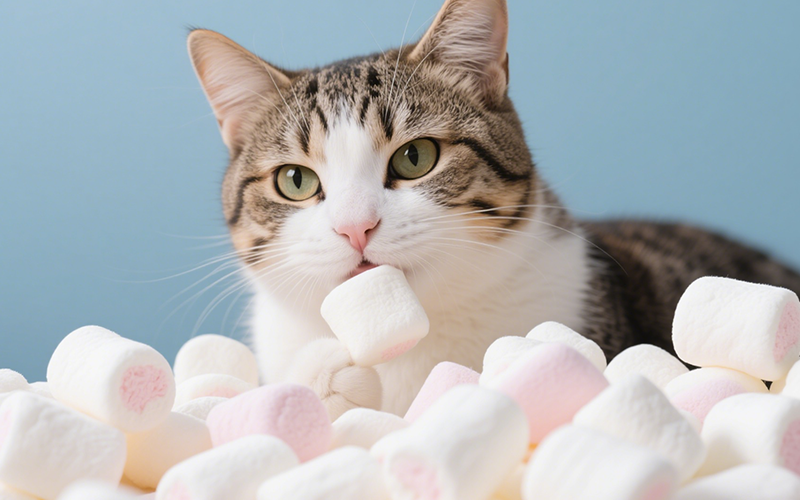Can Cats Eat Cheez-Its? What You Need to Know About This Snack
- 4 Mar 2025 10:51
As a cat owner, you may find yourself snacking on your favorite foods while your feline friend looks at you curiously. One question that might pop up is, can cats eat Cheez-Its? While these popular cheesy crackers might be tempting to share with your cat, there are a few things to consider before offering them to your pet.
In this article, we’ll explore whether Cheez-Its are safe for cats, the potential risks involved, and healthier alternatives for your feline friend.

Are Cheez-Its Safe for Cats?
❌ Not the Best Choice for Cats
While Cheez-Its aren’t toxic to cats, they are not an ideal treat for them. These crackers are high in salt, fat, and artificial ingredients, which are not suitable for a cat's digestive system and can cause several health problems if consumed regularly.
Cats are obligate carnivores, meaning they require a diet based on animal protein. Cheez-Its, being made from processed grains, cheese, and seasonings, do not provide the necessary nutrients for a cat’s health. In fact, feeding your cat processed human snacks like Cheez-Its can lead to issues like obesity, diabetes, and digestive discomfort.
❗ Risks of Feeding Cheez-Its to Cats
High Sodium Content
Cheez-Its contain a significant amount of salt, which can be harmful to cats. Excessive salt can cause thirst, kidney problems, and even salt toxicity in extreme cases. Cats who consume too much salt may also experience vomiting, diarrhea, and tremors.Artificial Ingredients
Cheez-Its include several artificial additives such as colorings, preservatives, and flavor enhancers. These ingredients can be difficult for cats to digest and might contribute to allergic reactions or other health issues, like stomach upset.Fat Content
The high fat content in Cheez-Its is not ideal for cats, particularly for those with sensitive stomachs or those that are overweight. Too much fat can lead to pancreatitis, a condition that causes inflammation of the pancreas, or contribute to obesity over time.Choking Hazard
Cheez-Its are small and crunchy, and if your cat eats them too quickly or without chewing properly, there’s a potential for a choking hazard, especially for smaller cats.
Can Cats Eat Cheez-Its in Moderation?
While Cheez-Its are not the healthiest treat for cats, giving them a tiny piece as an occasional snack is unlikely to cause harm. However, it should be a rare exception, not a regular part of their diet. If your cat does happen to eat a Cheez-It or two, keep an eye out for any signs of digestive upset like vomiting or diarrhea, and contact your veterinarian if you're concerned.
Healthier Treats for Cats
If you want to treat your cat, it’s better to choose healthier, cat-friendly options that are safe and beneficial for their health. Here are some alternatives to Cheez-Its:
1. Commercial Cat Treats
Look for nutritious, cat-specific treats that are formulated with the right balance of protein, vitamins, and minerals for your cat’s diet. Many brands offer treats that are designed to support dental health, skin health, and even joint health.
2. Small Pieces of Cooked Meat
Cats love protein, so offering small portions of cooked chicken, turkey, or beef can be a great treat. Just make sure the meat is plain, without any seasoning, and avoid giving bones to your cat.
3. Freeze-Dried Treats
Freeze-dried meats are a natural and healthy treat option for cats. They’re packed with protein and nutrients, and cats usually love the taste.
4. Catnip
Many cats go crazy for catnip, which can be a fun and safe treat to offer. It’s also great for stimulating mental and physical activity.
5. Small Pieces of Fruits or Vegetables
Some cats enjoy a small bite of carrot, cucumber, or melon. Be sure to offer them in small pieces and watch for any digestive reactions.
Final Verdict: Can Cats Eat Cheez-Its?
❌ Cheez-Its are not the best snack for cats. While they aren’t toxic, they contain excessive amounts of salt, fat, and artificial ingredients that can lead to health problems if consumed frequently. They should be avoided as a regular treat.
⚠ If your cat eats a Cheez-It by accident, there’s no need to panic, but it’s important to avoid feeding them this type of snack in the future. Always offer cat-friendly treats that provide nutritional value.
💡 Need help understanding what foods are safe for your cat? Consider using PettureX, a 24/7 AI-powered pet health assistant. PettureX provides instant consultations and image recognition to help you determine if certain foods are safe for your cat. It’s a great tool to guide you in making the best choices for your pet’s diet and overall health.
If you have more questions about your cat’s diet, feel free to ask! 🐱💛
Related

Persimmons and Paws: Can Cats Safely Eat This Autumn Fruit? A Vet-Reviewed Guide
- 23 Apr 2025
Nutritional Yeast for Cats: Savory Sprinkle or Health Hazard? A Vet-Reviewed Guide
- 23 Apr 2025
Marshmallows and Cats: A Puffy Problem? Why Vets Say No to This Sugary Snack
- 22 Apr 2025
Kefir for Kitties? A Veterinarian-Reviewed Guide to Safety, Benefits & Risks
- 22 Apr 2025
The Burning Question: Can Cats Eat Jalapenos? A Comprehensive Safety Guide
- 21 Apr 2025
Cool Temptation: Can Cats Eat Ice Cream Safely? The Vet-Backed Truth
- 21 Apr 2025
Frankly Dangerous: Can Cats Eat Hot Dogs? Vet Explains the Serious Risks
- 16 Apr 2025
A Purrfect Protein? Can Cats Eat Ground Turkey Safely? (Vet-Reviewed Guide)
- 16 Apr 2025
Gritty Situation: Can Cats Eat Grits Safely? Vet Explains the Risks
- 16 Apr 2025
Gravy Danger Zone: Can Cats Eat Gravy Safely? (Vet-Reviewed Warning)
- 16 Apr 2025
